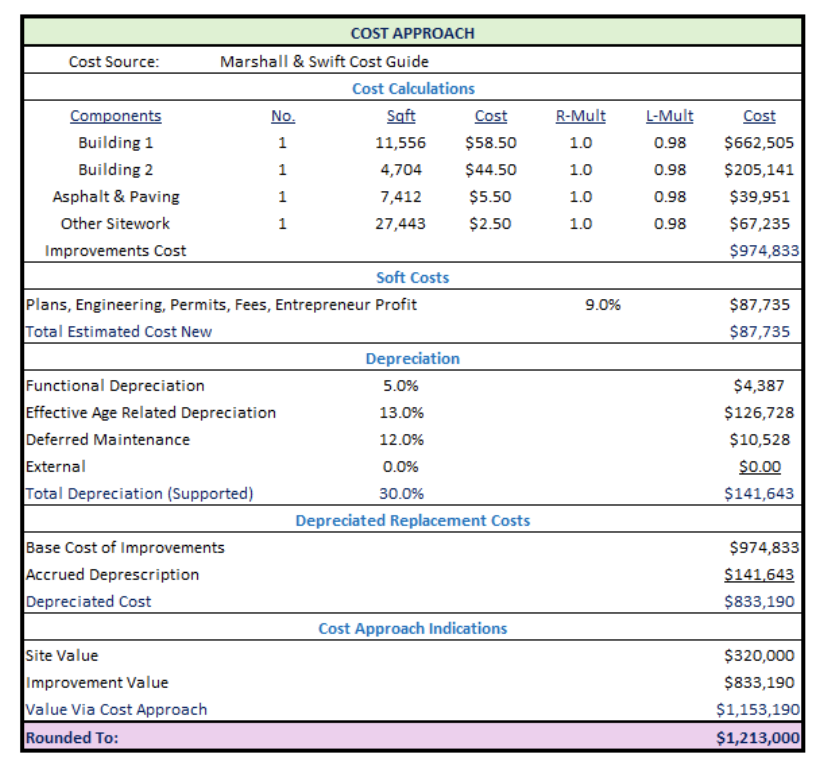For your convenience we have provided an in depth discussion which explains many of the factors we must consider before providing you with a price quote. Unlike residential homes, commercial and industrial properties tend to be highly unique. Each case must be treated as special.
A common question is, “How much do you charge for an appraisal?”
The answer depends on a number of factors including Appraisal Type, Complexity, Property Location, Property Type, Purpose of Appraisal, and Report Type.
The cost of having Bluegrass Industrial Appraisal complete your next appraisal depends primarily on these six factors. Once we know the characteristics of your property, and your specific needs, we can provide you with a Price Quote. Customarily, in our Coverage Area, which is Louisville, Kentucky, the Louisville Metropolitan Statistical Area (MSA) including Clark & Floyd Counties in Southern Indiana, commercial appraisals typically cost between $1,250 and $3,450 depending on the Complexity and other factors.
There are three Recognized Approaches to Value. They are:
1) The Cost Approach estimates value based on the typical cost of materials, labor and coordination costs necessary to build a similar building or buildings and all the necessary site improvements, while accounting for depreciation due to age and condition.
2) The Sales Comparison Approach estimates value based upon the price, in the local market, necessary to acquire a property of similar location, quality, size, age, and condition.
3) The Income Approach estimates value based upon typical market income of a similar property.
It is the appraiser’s responsibility to assess each specific property, prior to accepting an appraisal assignment, and advise the client which of these approaches are applicable to the specific property being appraised.
Not every Approach to Value is relevant or applicable to every property. For example, the Cost Approach is never an applicable approach with regard to a condominium. In most cases the Income Approach is not applicable or at least necessary in appraising a single family home. And the Cost Approach is not applicable when appraising a 19th-centruy stone, masonry church building.
A Complete Appraisal is an appraisal that considers and then develops all the Relevant Approaches to Value for the specific property.
A specific property may have 1, 2 or 3 Relevant Approaches to value. For example, a modern, multi-unit, office complex, in an urban setting would require the development of all three Approaches to Value in order to meet the standards for a Complete Appraisal.
In the cost approach to value, the cost to acquire the land plus the cost of the improvements minus any accrued depreciation equals value. Depreciation is a loss in value from any cause, and can take the form of physical deterioration, functional obsolescence, or economic obsolescence. The underlying premise of the cost approach is that ‘a potential user of real estate won’t, or shouldn’t, pay more for a property than it would cost to build an equivalent
(Principle of Substitution)
In real estate appraisal, the Principle of Contribution states that the value of a property component is measured by its monetary or economic Contribution to the total property's market value, rather than by its cost to add that component. An appraiser determines the contributory value by observing what a buyer would be willing to pay for that specific part of the property in the current market, which can result in a cost exceeding or falling short of the improvement's actual cost.

At Bluegrass Industrial Appraisal we are experts at estimating construction costs and determining the economic loss in market value as a result of external factors, physical deterioration, obsolescence, wear & tear and actual age.
The Sales Comparison Approach is directly rooted in the real estate market. The value of the subject property is equal to the sales prices of comparable properties plus or minus any adjustments. The sales comparison approach compares a piece of property to other properties with similar characteristics that have been sold recently. The sales comparison approach considers the affect that individual features have on the overall property value, meaning that the total value of the property is a sum of the values of all of its features.
The Income Approach to value quantifies the present worth of future benefits associated with ownership of the real estate asset.

Our approach here at Bluegrass Industrial is to capitalize the Net Operating Income of a property at a market derived rate. The net income is divided by a capitalization rate (the investor’s desired rate of return) for an estimate of value.
Not every Approach to Value is relevant or applicable to every property. For example, the Cost Approach is never an applicable approach with regard to a condominium. In most cases the Income Approach is not applicable, or at least necessary, when appraising a single family home. And the Cost Approach is not applicable when appraising a 19th-centruy stone, masonry church building.
A Complete Appraisal is an appraisal that considers and then develops all the Relevant Approaches to Value for the specific property.
A specific property may have 1, 2 or 3 Relevant Approaches to value. For example, a modern, multi-unit, office complex, in an urban setting, would require the development of all three Approaches to Value in order to meet the standards for a Complete Appraisal.